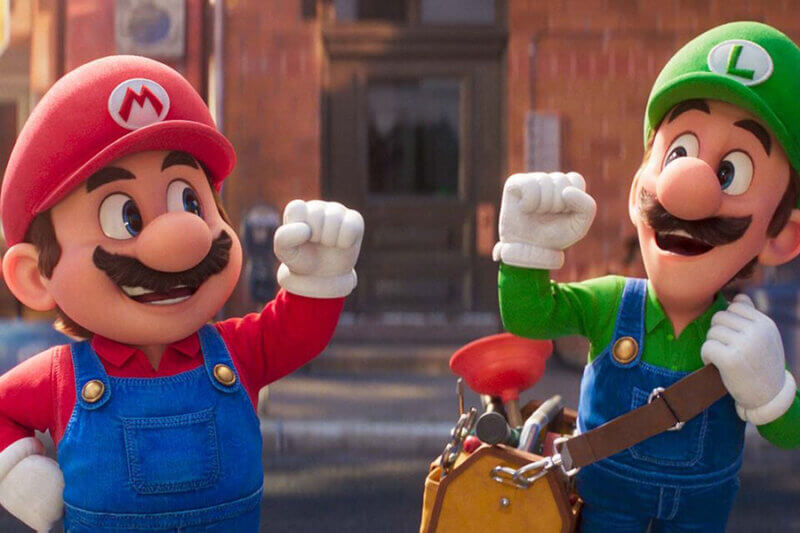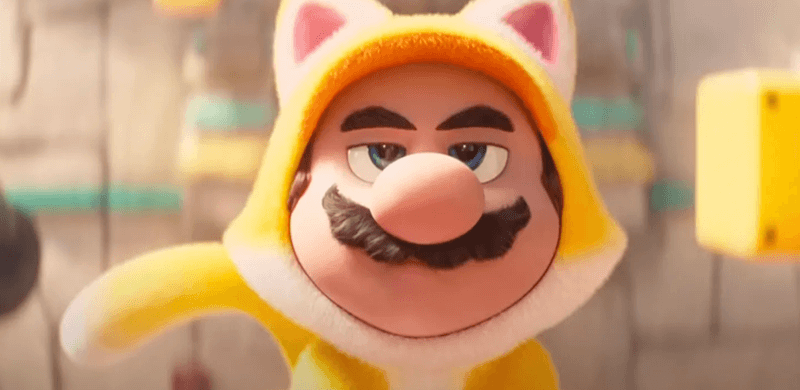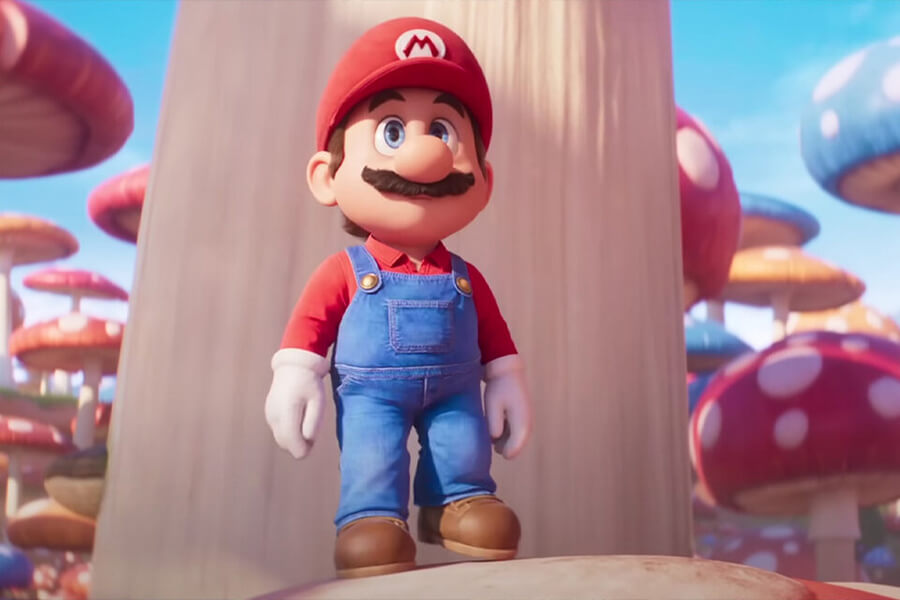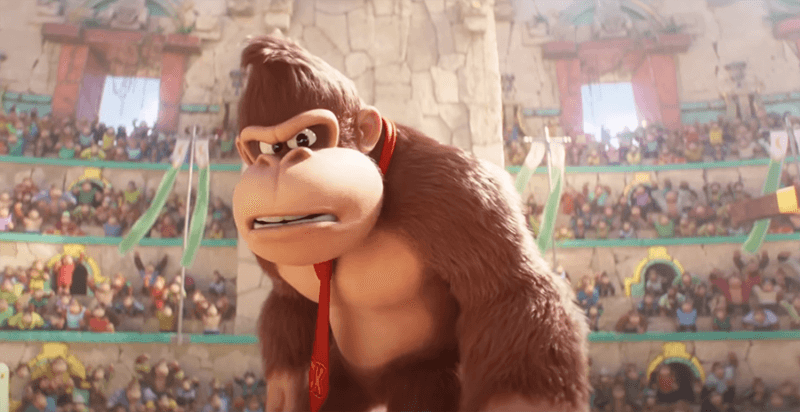The Super Mario Bros. Movie Review – A Love Letter to the Love Letter to the Franchise

The reclamation of nerd culture has hit its peak, their revenge is complete. The mainline Mario video game franchise is perhaps the most storyless series of games to feature human characters, to expand that into a feature film takes some stretching of lore and insertions that dampen the faithfulness of the adaptation. This task felt overbearing for Rocky Morton and Annabel Jankel’s now 30 year old film. Though that film was unsuccessful for myriad reasons, its entire construction is an admission that the original text is little more than wafer-thin. The existence of this year’s mega-blockbuster based on the same franchise is proof of where culture has moved over the last three decades. The expectation is that The Super Mario Bros. Movie will be one of the highest grossing films of the year, rather than a risky adaptation of what was still a niche genre of entertainment at the time.
Luckily for directors Aaron Horvath and Michael Jelenic, their pool of resources is wider than what was available during the development of the previous Mario adaptation. Not only has there been a mountain of games released in that time, spanning kingdoms and galaxies, but the expansion of internet communities of Nintendo fans has provided another well to dip into. When a fan sits down to watch The Super Mario Bros. Movie, they want to see their experience reflected, to form a bond with the filmmakers and feel that they’re just as in love with the franchise. Throwing in the eel from Super Mario 64 is a reference to a game, having a Toad tell another Toad to blow into their NES cartridge is a reference to a personal experience.
References form the bedrock of what this movie is, meaning there are two ways to analyse the success of this film. Either you see it as a vehicle for fan fulfilment, a moment for Nintendo heads to bask in the mainstream Hollywood sun, or as a film you walk into as a completely detached citizen who refers to any machine capable of running ROMs as a “Game Station.” A love letter is only legible to those immersed in the franchise, otherwise you’re as lost as a baby penguin in Tostarena (see what I mean). There is a sense of prevalent video game snobbery in film communities, with games often being looked down upon as brain-rotting time wasters while cinema is often depicted as the peak of artistic expression. Already we can see a divide in reviews coming from written publications and those existing on YouTube, there’s something to “get” which one side is embracing and the other is neglecting.

The Super Mario Bros Movie (2023) Photo – Nintendo
I will not pretend that I walk in both worlds. I slapped on every thread of Nintendo attire I possibly could for the screening and clapped and yelped and hollered at the inclusion of the Punch Out restaurant, the GameCube ringtone and the sheer surreal nature of seeing these characters, once bound to my GameBoy screen, living out this gorgeously animated adventure in front of me. Each miniscule reference imbued me with an injection of joy and like a trail of sugar-coated morsels had me narrowly focused on the experience of the narrative from its inception to its conclusion (and post-credits conclusions).
There’s a built in cynical critic residing in my mind, ready to denounce my own enjoyment when I mention being entertained by references and call-backs. By no means should that be what all movies strive for, but that doesn’t mean that it doesn’t take skill, love and care. Films are enjoyable when you get the sense that the filmmakers really gave a crap about the work they were doing. Aaron Horvath and Michael Jelenic were hyperfocused on pleasing fans with The Super Mario Bros. Movie, to the detriment of their Rotten Tomatoes score. References feel cheap to some but exhilarating to others because the thing that we like more than anyone else in our real life is reflected. It’s the most basic level of being seen, but everybody wants to be seen.
Undeniably, The Super Mario Bros. Movie achieves its goal of representing the experience of a Nintendo fan, whether they lived through the video game crash of the 1980s or fell in love with the company through Mario Tennis: Ultra Smash. Visually, musically, verbally, the film exudes a warmth and joy which emanates from a team thrilled to be able to tell this story.

The Super Mario Bros Movie (2023) Photo – Illumination
Equally present is a dedication to detail unmatched by animation studio Illumination’s previous output. As audiences are considering ridding themselves of their almost 20 year marriage with completely CG animation and are gazing longingly at the greener grass of inventive 2D-3D blending, The Super Mario Bros. Movie was in danger of looking half a decade behind in its approach. Vibrancy of colour, forensically constructed textures and lassi-smooth movement remind us of the beauty CG animation is capable of when pushed a little farther.
Also helping is the supreme deftness with which the camera is moved throughout this adventure. Lakitu, or Illumination’s equivalent, consistently finds interesting angles to take to picture the action. Eagle-eyed views of blocks falling just as they leave Mario’s feet, an unbroken take sweeping through Bowser’s kingdom and a voyage inside the mouth of an eel provide a technical proficiency few were expecting when this film was first announced.
Translating what we see on screen into an imagination-based reality is part of the gig as a video game player. Even as we inch closer to realism and enhanced expression in games, we still have to fill in some gaps on how a texture would really look or how one would actually interact with a power-up. In taking those models, tweaking them for the film and blowing them up onto IMAX screens can make for an alienating experience for fans extremely attached to the less-detailed originals. Adjustments made to characters like Donkey Kong and Bowser achieve the goal of bringing more expression to their faces and movements while being in line with what fans would expect these characters to look like in a slightly more realistic setting. I found myself mesmerised at times by the detail of Bowser’s scales, the hairs in Luigi’s moustache and the newly introduced biology of a Bullet Bill (one gets its eye poked. I never imagined they worked like that. I never thought they were living beings. What a painful existence to be born and exploded within seconds).

Donkey Kong in The Super Mario Bros Movie (2023) Photo – Nintendo
The ambition of adding further colour to established Mario lore is something greatly satisfying about the film. The involvement of Mario creator, Shigeru Miyamoto, was certainly a crucial factor in making these new additions feel consistent with fan expectations. Delightfully, Bowser is depicted as a sappy romantic with a cold, hard exterior, giving shine to his soft core which melts whenever in the presence of Princess Peach. Bowser is something of a Lord Farad figure here. His endgame has always been to marry Peach, but attempts to woo her, scenes of him fawning and obsessing over her, have never crossed my mind as a possibility. Jack Black even gets the chance to stretch his vocal chords in magnificent musical sequences as sonnets flow through his raspy voice.
Smaller details such as practical uses for karting, coin blocks acting as ATMs and explanations for Mario and Luigi’s colour-coded outfits naturally progress established imagery and lore. Such delights are only accessible to those well-versed in the series, the ability to extract entertainment from them the reward for years of dedicated fandom. The subjectivity of whether or not one will find entertainment from a film is enhanced for the Mario Movie. What will a casual moviegoer gain from a montage which sees Mario, Toad and Peach trek through Bob-Omb Battlefield and contemplate the many galaxies in existence?
Committing so full-heartedly to one section of the audience leads to the film requiring some balance. It looks to achieve that through unfortunately tired gimmicks from the Illumination handbook. A gripe many will have is the healthy dose of decades-old licensed music injected at various points. Nothing screams of a lack of confidence in entertaining a slightly older audience more. “Take On Me” blares over the action as Mario karts through the Kong Kingdom, an area derived from games with some of the most iconic video game music ever created.
The Super Mario Bros. Movie, for the most part, does a respectful job of incorporating original game soundtracks into the film without orchestrating them beyond recognition. However, that good work feels compromised by half-baked attempts to stop 40-year-old men from checking out completely. Why aren’t more of Grant Kirkhope’s iconic themes which have spawned an entire subculture on their own more present? Decisions like this are made without the target audience in mind, making for a disruption to the immersion.
The film’s frantic pacing also feels designed to keep audiences on their toes and away from their watches. The 90 minute runtime feels breezier than what’s natural for any film. The colourful animation and immense detail are great, but also contribute to each frame pulling your eyes in every direction without as much as a second to breathe. Some will give in to the sugar rush, but it will be incomprehensibly quick for others.
Additionally, the pacing leaves characters feeling incomplete, and what are intended as emotional climaxes, feeling bare. Mario and Luigi’s brotherly connection is just about developed enough through half-hourly slim gaps of breathing room from the main plot for their eventual triumph to feel satisfying, but the arcs of characters like Princess Peach and Donkey Kong seem to be set up and resolved within the same sequence of dialogue. More time could have been spent with Mario and Luigi processing the bizarre new world they land in, or with Princess Peach trying to make sense of seeing another human being for the first time since her memory began. However, the immediate acceptance characters have of their situation reflects the familiarity which the intended audience feels towards that same imagery.
When space is made for references and fan self-insertion over character, it’s hard for your thoughts to stray away from the fact that you’re watching a corporate product. Pandering to a section of your audience out of fear that they won’t be 100% invested in a way that breaks the immersion of those you already have on board before the movie begins and compromises the depth of your characters is a frustrating route to take.
Creating a cinematic love letter fundamentally comes with the alienation of part of the audience. Committing to pleasing one side of the crowd and boldly ignoring the other is admirable, but isn’t Illumination’s style. The film is so close to charging into fan bliss but Akira-slides just before it has to take the full leap.
The Super Mario Bros. Movie did not have to have structural problems and pacing issues. There’s a not too dissimilar version that is a genuinely fulfilling cinematic experience worthy of inclusion amongst the best animated films of the year. The product we get has obviously recognisable flaws.
However, it takes some special sauce to be able to craft a flawed film where those flaws skip right over your head and while you’re locked in. The low Rotten Tomatoes score should be held as a badge of honour for this film, it’s a wonderful feeling to experience something tailor made for you and incomprehensible for somebody else. That being said, I wish that score was lower.
I wish they went further and resisted the urge to throw in hits from the 80s and squeeze out any of the time for the characters to breathe. I wish we had gotten more complicated, weird backstories rather than common denominator insertions about daddy issues (which almost every main character has). Fuck the critics, fuck anyone else who isn’t a fan. When the doors close and the Nintendo logo pops up, that cinema is a sacred space for Mario heads. A culmination of 40 years of fandom, a chance for us to reign supreme in a different medium, on foreign land. The experience of watching The Super Mario Bros. Movie will stick with me until my brain rots from all those games I keep playing. It’s flawed, it’s messy, it’s silly, childish, there’s pacing issues, dumb music decisions and still manages to be a resounding victory for the nerds. Keeping in step with the game series, bring on the weirder, deep cut sequel and for the love of Miyamoto, put Waluigi in it.
The Super Mario Bros. Movie is out in UK cinemas now.

